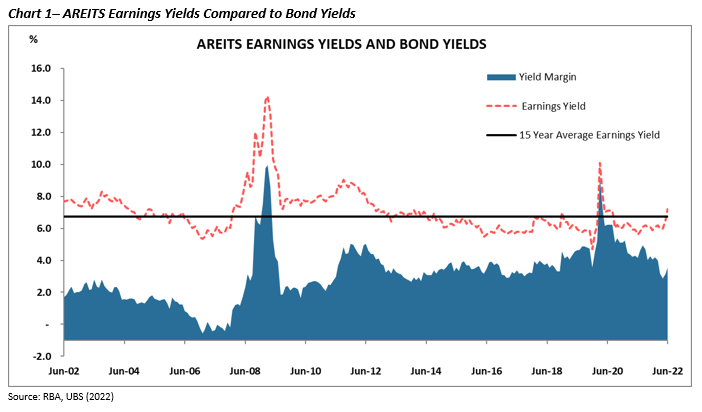By Chris Owens, analyst, Atchison Consultants
Australian real estate investment trusts (AREITs), as represented by the S&P/ASX 200 AREIT Index, returned -10.3% in the month ending 30 June 2022. AREITs underperformed the S&P/ASX 200 return of -8.8% over the month.
Over the 12 months to June 2022, AREITs posted a total return of -12.3%, underperforming the S&P/ASX 200 return of -6.5%.
Sector Performance
Table 1 below shows the performance of AREITs for various periods ending 30 June 2022.
Over the 3 years and 5 years to the end of June, the sector produced total returns of -2.8% and 4.4% per annum respectively.
Sector return falls were led by Industrial AREITs at -12.7%, followed by Office AREITs at -12.0%, Diversified AREITs at -11.1% and Retail AREITs at -7.2%.
Table 2 below shows the income performance of AREITs for various periods ending 30 June 2022.
The income component of the total return was 3.7% for the 12-month period to June. Annual volatility of income returns was 1.7%, which is low when compared with other asset classes.
AREITs were trading at an earnings yield of approximately 7.2% at the end of the month, higher than yields of both cash and Commonwealth Government bonds. However, the spread of the earnings yield over the 10-year government bond yield rose from 3.1% to 3.6% as earning yields rose.
Changes over time of the spread between the earnings yield of AREITs and the 10-year government bond yield are shown in Chart 1.
Market Review
Interest in Environmental, Social and Governance (ESG) standards for investing rose sharply in the 12 months to December 2021. Australian sustainable investments rose 66% during this period to $33.4 billion. ESG standards are set for AREITs by the Global Real Estate Sustainability Benchmark (GRESB), an international benchmark for ESG performance of real assets. GRESB has become the de-facto standard used by real estate investors to monitor their investments and understand performance across ESG factors.
In 2021, Australian property companies topped the GRESB Real Estate Assessment ranking. Australia has topped the list for the 11th year in a row. Dexus, the largest office AREIT was named the Global Sector Leader for its contribution to sustainable buildings across Australia’s key cities.
Vicinity Centres was named regional sector leader for retail. The mall landlord has a target of net zero carbon emissions for the common areas of its buildings and it has improved energy efficiency by 23% and cut emissions by 44% over the past 5 years. Lendlease, another AREIT with net zero commitments, says that strong sustainability targets are critical for attracting capital partners and quality tenants. The AREIT is targeting absolute net zero by 2040, which will mean emitting zero carbon, either directly or indirectly, without the use of offsets.
Companies using the GRESB saw the largest-ever growth and accounted for US$5.7 trillion of assets under management in 2021, up from US$4.8 trillion in 2020.




